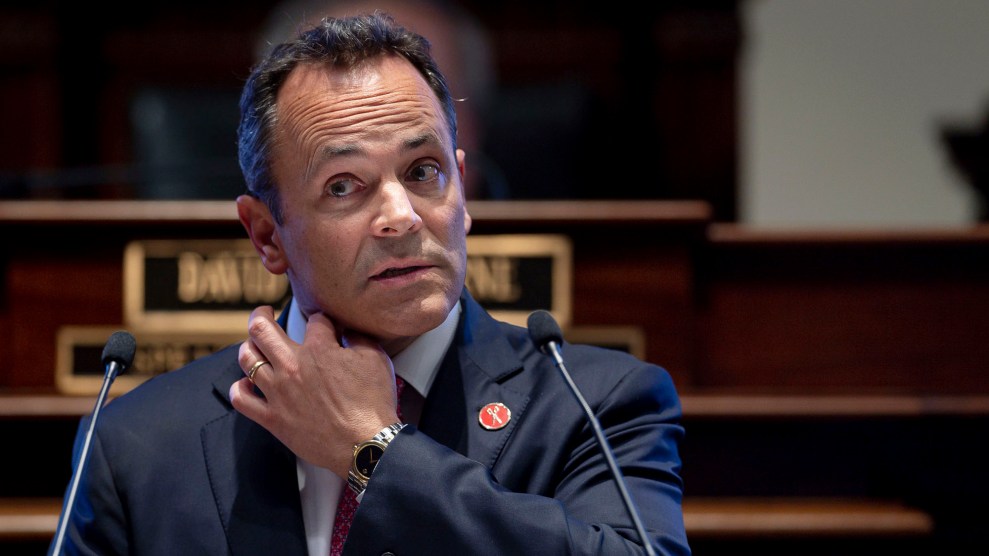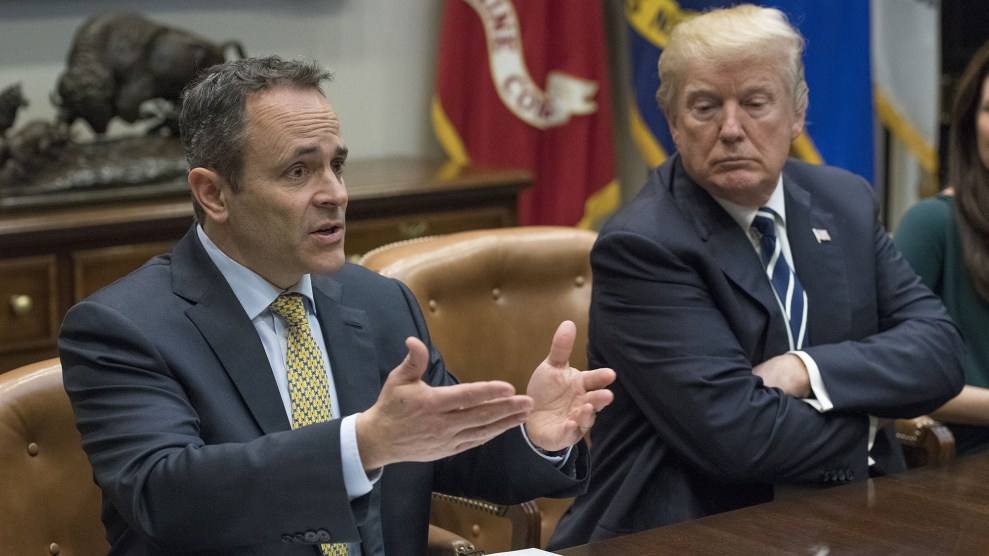
Kentucky Gov. Matt Bevin delivers the State of the Commonwealth address on February 7, 2019.Bryan Woolston/AP
As Kentucky Gov. Matt Bevin makes his final campaign push, he has hammered a message that has been central to his effort to win a second term: Elect him because he will do anything and everything to outlaw abortion in the state.
“4 Legislative Sessions > > > 10 #ProLife Bills,” Bevin tweeted from his official gubernatorial account last Wednesday, with a video of the governor holding babies. “The sanctity of human life should NOT be controversial, and our administration is committed to protecting it.” Later that afternoon, he tweeted a video of a 2018 appearance on Fox News, along with a message that read, in part, “we will ALWAYS fight against the barbaric and gruesome practice of live dismemberment abortion, which seeks to undermine and devalue the sanctity of human life.”
Bevin is locked in a toss-up ahead of next week’s election. The only recent public opinion poll of the race showed the Republican incumbent tied with his opponent, current Attorney General Andy Beshear.
Democrats long dominated state politics post-Reconstruction, but the political climate there has been trending Republican for decades, and Bevin shouldn’t have to sweat reelection. Yet his political future is on the line largely because he spent the past four years seemingly offending whomever he could in the state—especially the state’s public school teachers, who Bevin has repeatedly clashed with over his effort to overhaul the state’s pension system. He has even tangled with members of his own party. A Republican state senator hosted a “Bullied by Bevin” picnic earlier this summer, and Bevin’s own lieutenant governor filed a lawsuit against him for firing her staff. Morning Consult polls consistently ranked him as the least popular governor in the country, until October when he inched up a spot.
But Bevin is relying on his anti-abortion bona fides to try to win back supporters in the socially conservative state.
Bevin has never been shy about mixing religion and politics, coming out strongly behind Kim Davis during his 2015 gubernatorial campaign when the Kentucky town clerk became a national figure for refusing to grant marriage licenses to same-sex couples. (Once he became governor, Bevin appeased Davis by ending the state’s requirement that the names of county clerks appear on marriage licenses.) In early October, he tweeted support for “Bring Your Bible to School Day,” an event created by Focus on the Family, the James Dobson–founded organization that pushes social conservative causes. In an accompanying video, he said, “I would encourage you, please, don’t just bring your Bible to school, but read your Bible. Bring it, share it with others. If you have an extra Bible, bring it and share it with somebody who doesn’t have one, who maybe has never read this book.”
It’s fighting abortion rights where his zeal most shines through. Since taking over the governor’s mansion, he’s been hell-bent on restricting reproductive rights. Once he was joined by a Republican majority legislature in 2017, they teamed up to pass a wave of anti-abortion restrictions that Bevin eagerly signed into law. “Kentucky Now Has Some of the Toughest Anti-Abortion Laws in the Country,” a Planned Parenthood press release read earlier this year. Bevin has proudly owned that dubious distinction. “When you are the governor,” Bevin said at a Right to Life rally in Frankfort this year, “you are accused of many things. But one of the things that I take great pride [in] is being accused of being the most pro-life governor in America. I love it. Who would want to be anything other than pro-life?”
Shortly after taking office, Bevin exploited regulatory rules to shutter the lone abortion provider in Lexington, Kentucky’s second-largest city. That left EMW Women’s Surgical Center in Louisville as the sole clinic offering abortions in the state. The clinic has persistently fought Bevin in court to remain open. “All the laws that we’ve been challenging are patently and obviously unconstitutional,” says Heather Gatnarek, an ACLU lawyer who has been representing EMW.
The ACLU currently has four pending cases on behalf of EMW. The onslaught of legal challenges dates back to early 2017, “when our general assembly finally had enough members willing to vote for some of these extreme pieces of legislation,” Gatnarek says. The cases challenge new laws that force medically unnecessary narrated ultrasounds; ban dilation and evacuation, the most common form of abortion in the second trimester; and outlaw most abortions after six weeks, a measure Bevin signed into law earlier this year. All of these laws are on hold pending the ongoing litigation.
The ACLU has appealed the ultrasound law to the US Supreme Court, and the other EMW cases are currently or likely to be appealed to the 6th Circuit Court in Ohio (where six of the 16 active judges have been appointed by Trump) and could easily end up before the Supreme Court. Bevin hasn’t been shy about wanting to see Kentucky become the state that sends up the case that strikes down Roe v. Wade now that Brett Kavanaugh’s confirmation might provide an anti-abortion majority. “Some of these will go all the way to the…US Supreme Court,” Bevin said during his State of the Commonwealth address earlier this year, “but at the end of the day we will prevail because we stand on the side of right and we stand on the side of life.”
The fourth case the ACLU has challenged poses the most immediate and dire threat for EMW. The state has a law mandating abortion clinics sign ambulance transport agreements, a requirement that EMW easily met for over a decade, only to be told they failed requirements once Bevin’s appointees took office. Beshear, along with 21 other attorneys general, filed briefs arguing against the Bevin administration’s attempts to shut down EWR. “It’s safe to say that it can be quite exhausting,” Gatnarek says of the clinic’s past few years battling the Bevin administration. (EMW referred press requests to the ACLU.) “I know that it is an unfortunate addition to the priorities of the doctors and the staff at the clinic. I know that they’d much rather be focused solely on providing patient care rather than having to put any time or energy or resources towards these lawsuits.”
Those extra legal costs have forced EMW to raise prices, and no one is more aware of the consequences than Marcie Crim, who until recently worked as executive director of Kentucky Health Justice Network, the state’s main abortion fund, which offers funds and assistance for people who can’t afford to pay for their abortions.
Crim started as the group’s executive director two weeks before Trump won the 2016 election, which also swept in a Republican majority in the Kentucky state legislature. It was the first time Democrats had been completely out of power since the 1920s, allowing Bevin and his allies to begin a full-on assault on reproductive rights. “Everything became chaotic and frightening,” she says. “And access was being stripped away on a daily basis. More and more barriers were being erected, and as more barriers were being erected, more people were in need of assistance.” At first, she says, KHJN averaged 10 calls per week from people who needed assistance. But when I met with her at a coffee shop in Lexington in June, she told me the group had received 31 calls the previous week.
Pretty much every request related to abortion comes with an ask to help pay for the procedure itself. “I would say 90 percent of folks, even if they need transportation or lodging or anything else, they need assistance paying for the procedure,” Crim says. Kentucky is one of the most expensive states to get an abortion, and by law predating the Bevin era, no health insurance plan in the state—public or private—can pay for abortions unless the mother’s life is at risk (and unless the person pays for an additional separate policy). Per Crim, it costs $750 to get a pill-induced abortion at EMW, an option only available up through 10 weeks of pregnancy. “And then it shoots up in giant leaps,” she says of the cost.
And that’s only if you get an early-term abortion. Even before Bevin passed the 6-week ban (which is still on hold pending the ACLU lawsuit), the state limited abortions after 22 weeks. Crim says that many people KHJN works with struggled to save up funds, but were not able to pass through the logistical hurdles of getting to Louisville before reaching that limit. So increasingly, her organization has to help arrange travel for people to other states, sometimes sending the as far away as Colorado, New Mexico, and Washington, DC*.
Somewhat paradoxically, the effort to restrict abortion access has prompted more late-term abortions, the thing that Republicans supposedly most decry. “The folks in Frankfort and the Bevin administration, every single time they sign a law and put another barrier in place,” Crim says, “they push people to having to wait to get abortions.”
This spring, abortion rights sprung to the forefront of national politics. Alabama kicked off the wave by outlawing all abortions, and eight other states have passed similar bills. Missouri’s Republican governor tried to revoke the state’s last abortion provider’s license, a move currently embroiled in a legal battle that could, any day now, leave Missouri as the first state without any abortion provider in the era of Roe v. Wade.
Liberals nationwide reacted in horror to the spate of new laws. Hollywood stars called for a boycott of filming in Georgia over the state’s restrictions, and people across the country vowed that the largely male politicians behind these laws would come to regret their decisions when they had to face voters.
Bevin has made fighting abortion one of the central planks of his reelection campaign. After primary night results came in this spring, the governor held a press conference to hammer his opponent for supporting access to abortion. “Andy Beshear is somebody who literally brought NARAL in just in the last couple of days to help push him over the top in this primary; who is strongly and unapologetically pro-abortion. The contrast with [running-mate state Sen. Ralph Alvarado] and myself, who are strongly pro-life, who are supported by President Trump, and are supportive of the values of the people of Kentucky. It will be a binary choice.”
And the uncomfortable reality for Democrats in the state is that playing up social issues could work in Bevin’s favor. A 2014 poll from Pew found that 57 percent of adults in Kentucky think abortion should be illegal in all or most instances, and earlier this year a survey by Public Religion Research Institute found that only 43 percent of the state thought abortion should be legal in most cases. Social “issues continue to have some resonance in certain areas,” says Scott Lasley, a political science professor at Western Kentucky University. “Abortion is the number one. The legislature has been fairly aggressive… Bevin is very strong on those issues.”
And it’s not just Republicans who could be swayed by Bevin. “In Kentucky we have Democrats who are pro-choice and Democrats who are pro-life,” says Ben Self, the state Democratic chair. “We have both in the state. And because of that, obviously the party is the party of both of those folks. So I think, look, we are a big tent party and so it is a tough issue to talk about.” This year’s lieutenant governor candidate reflects that tension. While Beshear ran unabashedly pro-choice in his competitive primary, his running-mate Jacqueline Coleman described herself as a “pro-life compassionate Democrat,” when she ran for state House in 2014, though has since clarified that, while still pro-life personally. she stands by “each individual woman’s constitutional right to make her own reproductive and health care decisions.” Bevin’s campaign will serve as an initial test for whether Southern Republicans will be rewarded or repudiated for that assault on abortion rights.
Correction: An earlier version of this article misstated which states KHJN has sent people outside of Kentucky.
















